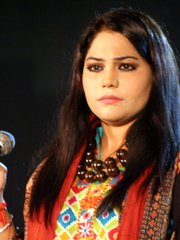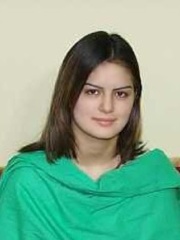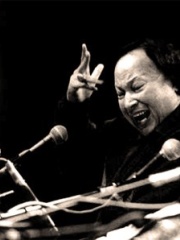
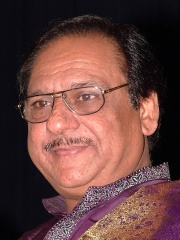
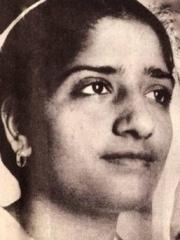
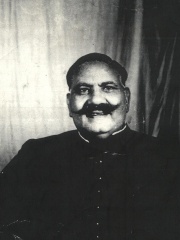
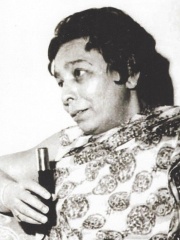
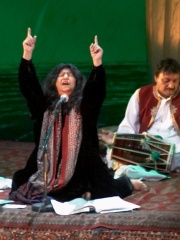
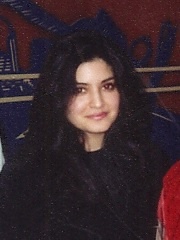
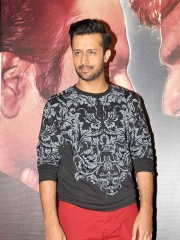
The Most Famous
SINGERS from Pakistan
This page contains a list of the greatest Pakistani Singers. The pantheon dataset contains 4,381 Singers, 11 of which were born in Pakistan. This makes Pakistan the birth place of the 64th most number of Singers behind Moldova, and Montenegro.
Top 10
The following people are considered by Pantheon to be the top 10 most legendary Pakistani Singers of all time. This list of famous Pakistani Singers is sorted by HPI (Historical Popularity Index), a metric that aggregates information on a biography's online popularity. Visit the rankings page to view the entire list of Pakistani Singers.

1. Nusrat Fateh Ali Khan (1948 - 1997)
With an HPI of 75.67, Nusrat Fateh Ali Khan is the most famous Pakistani Singer. His biography has been translated into 57 different languages on wikipedia.
Ustad Nusrat Fateh Ali Khan (14 October 1948 – 16 August 1997), also known by his initials NFAK, was a Pakistani singer, songwriter, multi-instrumentalist, composer, and music director, primarily associated with qawwali, a form of Sufi devotional music. He ranks as one of the most influential South Asian singers of all time. Widely recognised as the "Shahanshah-e-Qawwali" (lit. 'the King of Kings of Qawwali'), he has been recognised as one of the 50 Great Voices by NPR and 200 Greatest Singers of All Time by Rolling Stone. The New York Times named Khan the greatest qawwali singer of his generation. Credited with introducing Qawwali music to international audiences, he was known for his vocal abilities and could perform at a high level of intensity for several hours. Born in West Punjab, Khan had his first public performance at the age of 15 at his father's chelum. He became the head of the family qawwali party in 1971 and brought his unique style of sargam, khayal, and rhythm to his family's legacy. He was signed by Oriental Star Agencies, based in Birmingham, England, in the early 1980s. Khan went on to release movie scores and albums in Europe, India, Japan, Pakistan, and the United States. He engaged in collaborations and experiments with Western artists, becoming a well-known world music artist. He toured extensively, performing in over 40 countries. In addition to popularising qawwali music, he also had a profound impact on contemporary South Asian popular music, including Pakistani pop, Indian pop, and Bollywood music. He was also a master of Hindustani classical music.

2. Ghulam Ali (b. 1940)
With an HPI of 55.18, Ghulam Ali is the 2nd most famous Pakistani Singer. His biography has been translated into 15 different languages.
Ustad Ghulam Ali (Punjabi: غُلام علی; born 5 December 1940) is a Pakistani ghazal singer of the Patiala Gharana. Ghulam Ali is considered one of the greatest ghazal singers of his era. He has also been a prominent playback singer in Bollywood. He is a disciple of Bade Ghulam Ali Khan (elder Ghulam Ali Khan). Ali was also trained by Bade Ghulam Ali's younger brothers – Barkat Ali Khan and Mubarak Ali Khan. His style and variations in singing Ghazals are unique, as he blends Hindustani classical music with ghazals, unlike any other ghazal singer. He is highly popular in Pakistan, India, Afghanistan, Nepal, Bangladesh, as well as among South Asian diaspora in the US, the UK and the Middle Eastern countries. Many of his hit ghazals have been used in Bollywood movies. His famous ghazals are Chupke Chupke Raat Din, Kal Chaudhvin Ki Raat Thi, Hungama Hai Kyon Barpa, Chamakte Chand Ko, Kiya Hai Pyar Jisé, May Nazar Sé Pee Raha Hoon, Mastana Peeyé, Yé dil yé pagal dil, Apni Dhun Mein Rehta Hoon a ghazal by Nasir Kazmi, "Ham Ko Kiske Gham Ne Maara". His album "Hasratein" was nominated in the Best Ghazal Album category at the Star GIMA Awards 2014. He was married to Afsana Ali, with whom he has a daughter, Manjari Ghulam Ali. In 2015, due to protest by Shiv Sena at Mumbai, his concert was cancelled. After this, he received invitations from Delhi Chief Minister Arvind Kejriwal, West Bengal Chief Minister Mamata Banerjee and Uttar Pradesh Chief Minister Akhilesh Yadav. After this cancellation, he performed in Lucknow, New Delhi, Trivandrum, and Kozhikode, India. In a news item reported in 2015, Ghulam Ali has said that he won't perform in India until situation is right for music. He, however, assured that he will visit India when ‘the atmosphere is right.’ He said that he does not want to be used for political mileage. His sons Aamir Ghulam Ali and Nazar Ali Abbas are also musicians.

3. Surinder Kaur (1929 - 2006)
With an HPI of 51.13, Surinder Kaur is the 3rd most famous Pakistani Singer. Her biography has been translated into 19 different languages.
Surinder Kaur (25 November 1929 – 14 June 2006) was an Indian singer and songwriter. While she mainly sang Punjabi folk songs, where she is credited for pioneering and popularising the genre, Kaur also recorded songs as a playback singer for Hindi films between 1948 and 1952. For her contributions to Punjabi music, she earned the sobriquet Nightingale of Punjab, the Sangeet Natak Akademi Award in 1984, and the Padma Shri in 2006. In a career spanning nearly six decades, her repertoire included Punjabi Sufi Kafis of Bulleh Shah and verses by contemporary poets like Nand Lal Noorpuri, Amrita Pritam, Mohan Singh and Shiv Kumar Batalvi giving memorable songs like, "Maavan 'te dheean", "Jutti kasuri", "Madhaniyan", "Ehna akhiyan 'ch pavan kiven kajra', 'Ghaman di raat' and "Bajre da sitta". In time her wedding songs, most notably "Lathe di chadar", "Suhe ve cheere waleya" and "Kaala doria", have become an indelible part of the Punjabi culture.

4. Bade Ghulam Ali Khan (1902 - 1968)
With an HPI of 50.92, Bade Ghulam Ali Khan is the 4th most famous Pakistani Singer. His biography has been translated into 18 different languages.
Ustad Bade Ghulam Ali Khan (2 April 1902 – 23 April 1968) was an Indian-Pakistani vocalist, from the Kasur Patiala Gharana.
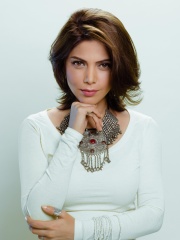
5. Hadiqa Kiani (b. 1972)
With an HPI of 49.17, Hadiqa Kiani is the 5th most famous Pakistani Singer. Her biography has been translated into 19 different languages.
Hadiqa Kiani (born 11 August 1972) is a Pakistani singer, songwriter, guitarist, actress, and social worker. She has won many national and international awards. Hadiqa has also performed at famous places like the Royal Albert Hall in the UK and The Kennedy Center in the USA. Along with Urdu and Punjabi, she has also sung songs in various local and international languages.

6. Shamshad Begum (1919 - 2013)
With an HPI of 47.72, Shamshad Begum is the 6th most famous Pakistani Singer. Her biography has been translated into 16 different languages.
Shamshad Begum (Urdu: شمشاد بیگم, IAST: Śamśād Bēgam; 14 April 1919 – 23 April 2013) was an Indian singer who was one of the first playback singers in the Hindi film industry. Notable for her distinctive voice and range, she sang over 6,000 songs in Hindustani, Bengali, Marathi, Gujarati, Tamil, and Punjabi languages, among which 1287 were Hindi film songs. She worked with renowned composers of the time, such as Ghulam Haider who first discovered her. She also worked with Naushad Ali and O. P. Nayyar, for whom she was one of their favorites. Her songs from the 1940s to the early 1970s remain popular and continue to be remixed.

7. Abida Parveen (b. 1954)
With an HPI of 46.36, Abida Parveen is the 7th most famous Pakistani Singer. Her biography has been translated into 28 different languages.
Abida Parveen (Sindhi: عابده پروين; Urdu: عابدہ پروین; born 20 February 1954) is a Pakistani singer, composer, musician of Sufi music, painter and an entrepreneur. Parveen is one of the highest-paid singers in Pakistan. Her singing and music have earned her many accolades, and she has been dubbed the Queen of Sufi music. Born and raised in Larkana into a Sindhi Sufi family, she was trained by her father, Ustad Ghulam Haider, who was a famous singer and music teacher. She plays the Pump organ, Keyboard, and Sitar. Parveen started performing in the early 1970s and came into global prominence in the 1990s. Since 1993, Parveen has toured globally, performing her first international concert at Buena Park, California. She has also performed in Churches, several times. Parveen features in Pakistan's popular musical show Coke Studio and was a judge on the pan-South Asia contest show Sur Kshetra alongside Runa Laila and Asha Bhosle, hosted by Ayesha Takia. She had appeared in various Indian and Pakistani music reality shows, including Pakistan Idol, Chhote Ustaad, and STAR Voice of India. In the last few years, she has sung in a Pepsi commercial, collaborating with Atif Aslam for this. Parveen is regularly referred to as one of the world's greatest mystic singers. She sings mainly ghazals, thumri, khyal, qawwali, raga (raag), Sufi rock, classical and semi-classical music, and her speciality, kafi, a solo genre accompanied by percussion and harmonium, using a repertoire of songs by Sufi poets. Parveen sings in Urdu, Sindhi, Punjabi, Arabic, and Persian. Parveen notably sang a famous song in Nepali language called "Ukali Orali Haruma", originally by Nepali singer Tara Devi, in a concert in Kathmandu, Nepal, and in 2017, she was designated a 'Peace Ambassador' by SAARC. Parveen is best known for singing in an impassioned, loud voice, especially on the songs Yaar ko Humne from the album Raqs-e-Bismil and Tere Ishq Nachaya, which is a rendition of Bulleh Shah's poetry. She was bestowed Pakistan's second highest civilian award, Hilal-e-Imtiaz, in 2012 and the highest civilian award, Nishan-e-Imtiaz, in March 2021, by the President of Pakistan.

8. Nazia Hassan (1965 - 2000)
With an HPI of 46.35, Nazia Hassan is the 8th most famous Pakistani Singer. Her biography has been translated into 26 different languages.
Nazia Hassan (3 April 1965 – 13 August 2000) was a Pakistani singer, songwriter, lawyer, political analyst, and philanthropist. Widely known as the "Queen of South Asian Pop,” she is regarded as one of the most influential musical figures in South Asian history and is the subcontinent's first ever pop star. Starting in the 1980s, as part of the duo Nazia and Zoheb, she and her brother Zoheb Hassan, have sold over 65 million records worldwide. Hassan made her singing debut with the song "Aap Jaisa Koi", which appeared in the Indian film Qurbani in 1980. She received praise for the single, and won the Filmfare Award for Best Female Playback Singer at the age of 15 in 1981, becoming the first Pakistani to win and currently remains the youngest recipient of the award to date. Her debut album, Disco Deewane, was released in 1981, and charted in fourteen countries worldwide and became the best-selling Asian pop record up at the time. The album included the English-language single "Disco Deewane" which led her to be the first Pakistani singer to make it to the British charts. Hassan followed up with the albums Boom Boom in 1982, part of which was used as the soundtrack of the film Star (1982), Young Tarang in 1984, and Hotline in 1987. The track "Dum Dum Dede" from Young Tarang was used in closing scene of the 2012 Indian film, Miss Lovely by Ashim Ahluwalia. Her last album, Camera Camera in 1992, was part of a campaign against drugs. Along with her brother, she also appeared in several television programs. In 1988 she appeared in Sung Sung with music maestro Sohail Rana. They also hosted the first-ever pop-music stage show, Music '89, produced by Shoaib Mansoor. Her success played a key role in shaping Pakistani pop music scene. Throughout her singing career spanning over 15 years, Hassan became one of South Asia's most popular celebrities. She was a recipient of Pakistan's civilian award, Pride of Performance Award posthumously in 2002. In addition to singing, she also engaged in philanthropic activities, and was appointed by UNICEF as its cultural ambassador in 1991. Hassan was married to businessman Ishtiaq Baig from 1995 to 2000, with whom she had a son. She died on 13 August 2000 at the age of 35 due to lung cancer in London.

9. Atif Aslam (b. 1983)
With an HPI of 37.37, Atif Aslam is the 9th most famous Pakistani Singer. His biography has been translated into 30 different languages.
Muhammad Atif Aslam (Punjabi: [aːtɪf əsləm]; born 12 March 1983), also known mononymously by the hypocorism Aadeez, is a Pakistani playback singer, songwriter, composer, and actor. He has recorded many songs in both Pakistan films and Indian films, and is known for his vocal belting technique. His music style has been described as a mixture of Pakistani pop and Sufi rock. He made his Bollywood film debut in 2005 by singing the song "Aadat" from Kalyug. Born in Wazirabad, Punjab, Atif Aslam started his music career in early 2000s. He released his debut album, Jal Pari, in 2004. He went on to sing songs in both Indian (Bollywood) and Pakistani (Lollywood) film industries. Aslam has been a prominent performer on Coke Studio Pakistan, where his renditions such as Tajdar-e-Haram (Season 8), Wohi Khuda Hai (Season 12), and Man Aamadeh Am (with Gul Panra) gained immense popularity, each amassing millions of views on YouTube and receiving critical acclaim. He predominantly sings in Urdu and his native Punjabi, as well as Bengali, Persian and Pashto. In 2008, he received the Tamgha-e-Imtiaz, the fourth-highest civilian honor award from the Pakistani government. He is also a recipient of several Lux Style Awards. In March 2003, he was introduced by McDonald's Pakistan to sing commercials for cartoons like Sonic The Hedgehog and Hello Kitty. Aslam made his acting debut in 2011, with the Urdu social drama film Bol. In 2019, he was awarded a star in the Dubai Walk of Fame after his nomination for the best singer in Pakistan. He was also featured in the Forbes Asia's 100 Digital Stars, published in December 2020.
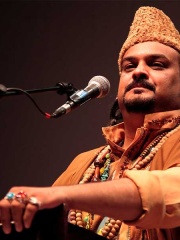
10. Amjad Sabri (1970 - 2016)
With an HPI of 34.94, Amjad Sabri is the 10th most famous Pakistani Singer. His biography has been translated into 20 different languages.
Amjad Farid Sabri (23 December 1970 – 22 June 2016) was a Pakistani qawwali singer and a proponent of the Sufi Muslim tradition. Son of Ghulam Farid Sabri and nephew of Maqbool Ahmed Sabri of the Sabri Brothers, he emerged as one of South Asia's prominent qawwali singers. He was assassinated in Karachi in June 2016 by terrorists of the Tehrik-e-Taliban Pakistan (TTP). The TTP Hakimullah Mehsud group claimed responsibility, saying they had assassinated him "for blasphemy".
People
Pantheon has 12 people classified as Pakistani singers born between 1902 and 1988. Of these 12, 5 (41.67%) of them are still alive today. The most famous living Pakistani singers include Ghulam Ali, Hadiqa Kiani, and Abida Parveen. The most famous deceased Pakistani singers include Nusrat Fateh Ali Khan, Surinder Kaur, and Bade Ghulam Ali Khan. As of April 2024, 1 new Pakistani singers have been added to Pantheon including Sanam Marvi.
Living Pakistani Singers
Go to all RankingsGhulam Ali
1940 - Present
HPI: 55.18
Hadiqa Kiani
1972 - Present
HPI: 49.17
Abida Parveen
1954 - Present
HPI: 46.36
Atif Aslam
1983 - Present
HPI: 37.37
Sanam Marvi
1986 - Present
HPI: 25.80
Deceased Pakistani Singers
Go to all RankingsNusrat Fateh Ali Khan
1948 - 1997
HPI: 75.67
Surinder Kaur
1929 - 2006
HPI: 51.13
Bade Ghulam Ali Khan
1902 - 1968
HPI: 50.92
Shamshad Begum
1919 - 2013
HPI: 47.72
Nazia Hassan
1965 - 2000
HPI: 46.35
Amjad Sabri
1970 - 2016
HPI: 34.94
Ghazala Javed
1988 - 2012
HPI: 0.00
Newly Added Pakistani Singers (2025)
Go to all RankingsOverlapping Lives
Which Singers were alive at the same time? This visualization shows the lifespans of the 7 most globally memorable Singers since 1700.

